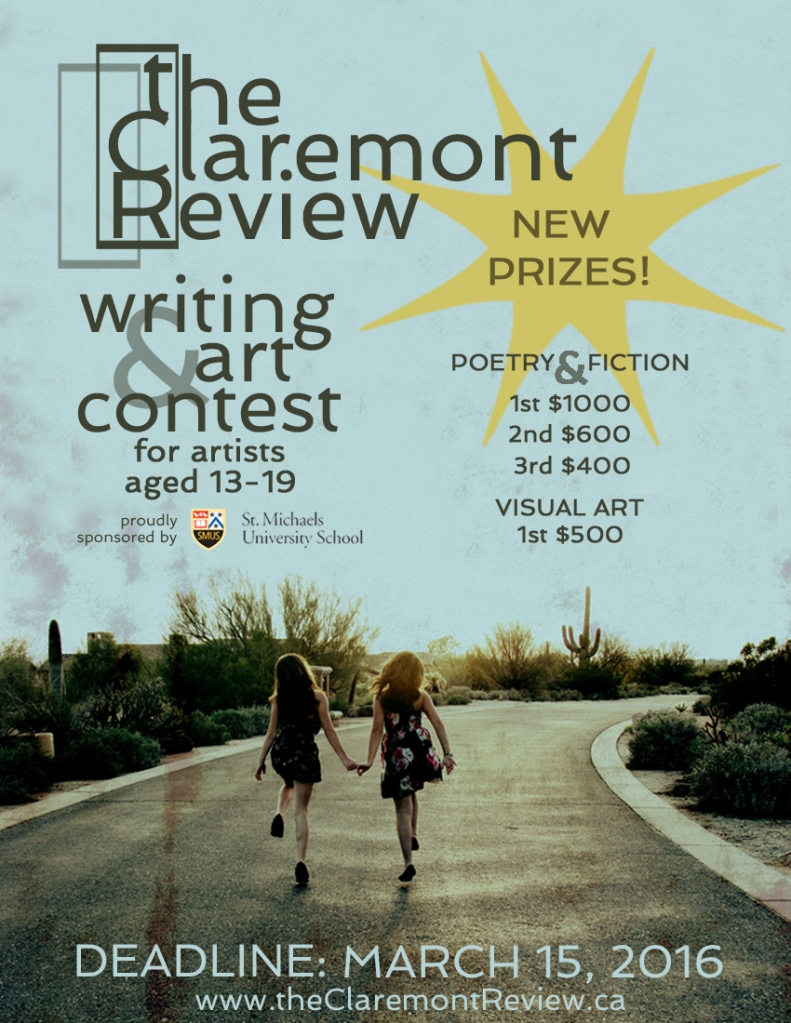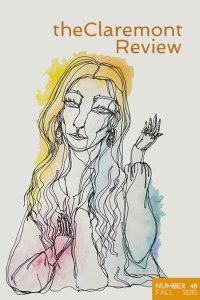Home » Posts tagged 'Short Stories'
Tag Archives: Short Stories
the Claremont Review’s Annual Writing & Art Contest is on
February 5, 2016 12:51 pm / Leave a comment
Last fall, we teamed up with the Claremont Review (tCR) an international magazine for young writers based out of Victoria, BC. tCR generously helped out the 2015-16 Alpha Textbooks Short Story Contest, by offering a space for our winners to be published in the journal. Judging for our contest is in the final stages, but tCR has a great contest of its own.
tCRs Annual Writing & Art Contest is open to teens (13-19) anywhere in the world. Not only are winners published, but they are awarded a handy sum of cash too. Jody Carrow, tCR editor-in-chief, told Alpha Textbooks “just this year [they] doubled the prize money, which makes the amounts very significant[,] $1000 for first” place, and a new $500 prize for visual arts. Second and third place young writers get $600 and $400 respectively. Winners are selected in both poetry and fiction categories.
Carrow mentions that the magazine receives entries from all over the world. Winners have come from Canada and the United States up until now, but she “expects that to change as [they] get more entries from youth around the world (Korea, Vietnam, India, the UK, Columbia, etc.).” The stories are kept anonymous throughout the judging process to keep the contest results free of bias.
When it comes to the volume of contest entries, Carrow says that she finds herself “in awe of how many young people still want to write”:
I am continuously amazed by the range of unique perspectives on age-old topics such as love, loss, identity, what makes a meaningful existence, relationships, the future…
To read so many heartfelt explorations of the human condition gives me hope for our collective future (even when, actually, ESPECIALLY when the writing is dark) because the act of writing means one hasn’t given up; it means that people still care to grapple with this great, messy, glorious event called Life.
What sets tCR apart from other magazines is that it offers feedback or mentorship to all youth who submit to the magazine. Unfortunately, because of the sheer volume of contest entries, the magazine editors cannot offer feedback on contest submissions. However, young writers are invited to rework their stories or poems and resubmit for general publication, or they can try submitting a totally different piece. Even if the works-in-progress aren’t published, the feedback process helps youths become better writers, bringing them one step closer to their goal.
Mentorship and feedback is essential to the longevity and quality of a young writer’s experience not only because when they take the time to read and consider it they become better writers, but the exchange creates a relationship that is always available to them. Our editors are committed to remaining mentors for young writers long after the initial exchange of feedback. Anyone who sends us work will get feedback from us and the writers/artists know they can write to us anytime with questions or concerns they have.
The contest deadline is March 15, 2016. Visit the Claremont Review‘s contest page for more details.
Read Alpha’s full interview with Jody Carrow.
the Claremont Review, along with the generous support of the Art Gallery of Ontario, the Royal Ontario Museum, Medieval Times Dinner & Tournament, and Pizza Pizza, made the Alpha Textbooks 2015-16 Short Story Contest possible. Thank you.
Heartfelt explorations of the human condition… Jody Carrow speaks about youth writing
February 4, 2016 6:26 pm / Leave a comment
 “… the act of writing means one hasn’t given up; it means that people still care to grapple with this great, messy, glorious event called Life. The fact that so many youth are choosing this method of making sense of the world means that they care deeply about the world they inhabit and want to share their perspectives on it.” ~ Jody Carrow
“… the act of writing means one hasn’t given up; it means that people still care to grapple with this great, messy, glorious event called Life. The fact that so many youth are choosing this method of making sense of the world means that they care deeply about the world they inhabit and want to share their perspectives on it.” ~ Jody Carrow
Nearly a quarter of a century old, the Claremont Review (tCR) is a journal that has come-of-age while publishing writers who are coming-of-age. As an international journal, the Canadian magazine publishes youth writing (ages 13-19) in English from five continents.
What separates the tCR from other journals is that it offers a rare, if not coveted, submission experience – the editors offer feedback: “All submissions accompanied by an email address receive a written comment on their work,” says the magazine’s website.
tCR also runs an annual contest. Not only are winners published in the magazine, but winners are offered generous monetary prizes. The 2016 first place winner is awarded $1000 CAD, second place receives $600, and third receives $400. Winners are selected in both poetry and fiction categories. There’s also one visual art prize of $500.
We spoke to Jody Carrow, Canadian writer and the editor-in-chief of tCR. Carrow offers an insightful understanding of youth writing, and the importance of nurturing and celebrating it.
Jody Carrow’s work has appeared in several Canadian literary magazines, including Grain and The Malahat Review (under her spy name: Jody Lesiuk). She has been a featured reader at many poetry events in Victoria, B.C., and is a graduate of the Creative Writing Program at the University of Victoria. As editor-in-chief at tCR, she is thrilled to work with skilled young writers and artists from all over the world.
This is what she had to say about youth writing and the contest:
Q: How long have you been volunteering at the Claremont Review as editor-in-chief and overall?
A: I have been with tCR for almost 4 years. I began as editor-in-chief and remain in that role. I am supported by an incredible team – Shannon Horlor, Leah Baade, Erin Renwick and Emily Henderson.
What inspired you to join the tCR?
Susan Stenson, a Victoria poet and co-founder of tCR, asked me if I would consider taking over the magazine as she, along with the other co-founders Terence Young and Bill Stenson, were looking to retire. They had been with the magazine for over 20 years and were looking to move on. I was very interested in the project because I love editing and the chance to be involved with a publication was a challenge I was keen to take on. My mind was virtually made up before I had even read any previous issues, but then when I actually read some back issues, I got really excited about what the pages held. I could not believe the quality of the writing – it far exceeded my expectations for youth literature (I am now humbled to admit). The writers became the inspiration for me.
How long as the Annual Writing Contest been running?
I believe there has always been a contest but just this year we doubled the prize money, which makes the amounts very significant ($1000.00 for 1st!) and added a first prize ($500.00) for visual arts.
What’s the contest vetting process like?
The process is a lengthy one as we get so many submissions and each one has to be read and considered. In the past I have done the shortlisting, but this year some of the editors will assist with that process. There is always a pile of obvious considerations, then a pile of maybes, and a pile of ones that don’t make the cut. The “maybe” pile is always the biggest and I return to it several times before making the final decision on what work goes to the judges. The shortlisting is a blind process, the cover letters are separated from the work before I even take a look at it to ensure no bias affects my decision making. Once there is a collection of work finalised in each category, we then send the work to the judges. We always have 2 judges in each category and have always managed to secure esteemed and successful writers to decide the winners. In the past we have had Melanie Siebert, Garth Martens, Ali Blythe, Jay Ruzesky, Hal Walling, Aaron Shephard, Susan Gee, Beth Copeland…this year’s judges are just being confirmed.
What’s your favourite part of the process (contest)?
My favourite part is the initial read through. Every year I find myself in awe of how many young people still want to write and take the time and effort to send us their work. I am continuously amazed by the range of unique perspectives on age-old topics such as love, loss, identity, what makes a meaningful existence, relationships, the future…
To read so many heartfelt explorations of the human condition gives me hope for our collective future (even when, actually, ESPECIALLY when the writing is dark) because the act of writing means one hasn’t given up; it means that people still care to grapple with this great, messy, glorious event called Life. The fact that so many youth are choosing this method of making sense of the world means that they care deeply about the world they inhabit and want to share their perspectives on it. This subverts the stereotype that youth don’t care about anything, that all that matters to them is the shallow surface of their lives. tCR proves how wrong anyone who assumes this is. The magazine (and others like it) gives us a glimpse into the future by showing us what matters to our youth. Anyone who doesn’t take the time to “check in” with this demographic by valuing and paying attention to their art has no idea what is going on or where the future is headed. Critics should be paying attention, social scientists should be reading us, political and spiritual leaders ought to know what is in our pages. The Canada Council for the Arts has been a huge proponent of what we do because they see the value in investing in a publication that showcases the talent of young writers and artists from Canada and around the world.
Are the winners generally from Canada, or have you had any international winners?
Both. We have winners from Canada in every contest and have had several from America. No one outside North America has won a prize yet, but I expect that to change as we get more and more entries from youth around the world (Korea, Vietnam, India, the UK, Colombia, etc.)
How do you think mentorship and feedback changes a young writer’s experience?
Mentorship and feedback is essential to the longevity and quality of a young writer’s experience not only because when they take the time to read and consider it they become better writers, but the exchange creates a relationship that is always available to them. Our editors are committed to remaining mentors for young writers long after the initial exchange of feedback. Anyone who sends us work will get feedback from us and the writers/artists know they can write to us anytime with questions or concerns they have.
It is very hard to have your work rejected. Adults struggle with it and I think it is especially difficult for young writers because they are that much more vulnerable to public opinion. This is why we give detailed feedback to every submitter (except for the contest entries) – we want them to know what is really great about their writing (and there is always something) and where it needs some work. This is done in the gentlest way possible while still giving them a taste of what the world of trying to publish looks like. We often hear back from youth who have given a piece another go and want us to take another look at it, or who have just even taken the time to write back and thank us for the feedback. We have a lot of repeat submitters, not all of whom have been published, so that gives us assurance that our feedback is useful and respectful. Something that builds writers up rather than tears them down.
In which countries is tCR distributed?
Magazines Canada distributes tCR in Canada and I believe the US. We get subscriptions from all around the world and handle those ourselves.
Have there been any future success stories of writers who were former contest winners or who got their career started at tCR?
Many, many writers who have published in tCR have gone on to become successful writers, filmmakers, poets, editors, etc.
Do you offer any special programs that writers, teachers or schools should know about?
In or around Victoria, BC where we are based, we offer free writing workshops and lectures to any class at the middle and high school level. We will travel to any school outside our region who would be willing to have us at their expense.
Is there anything else you would like to add?
Yes, thank you. I would like to ask parents, teachers, relatives and elders to encourage creative expression in the youth they are privileged to know. Don’t be afraid of what they want to say or show you with their art – see it for what it is: a statement or comment on life from someone who cares deeply about it and an opportunity for you to connect with them in a real way about what may be going on in their lives. Don’t worry about them necessarily because their topic is dark or disturbing. It may be hard to read a poem about rape or a story about mental illness or suicide, or look at a painting depicting a dystopian violent world created by your son/daughter/student. Read it anyway. Look at it no matter what and find some way of celebrating the courage it took them to not only create it, but share it with you. Find a way to talk to them about their work in a way that is supportive. You will lose them if you don’t. The time to worry is when they stop creating, stop opening up, stop wanting to grapple with life, not when they’re messy with it and reaching out!
Short Story Shortlist Announced
November 27, 2014 11:40 pm / Leave a comment
 We are pleased to announce the 2014 Alpha Textbooks Short Story Contest shortlist.
We are pleased to announce the 2014 Alpha Textbooks Short Story Contest shortlist.
This summer, Alpha Textbooks launched its first annual short story contest for middle and high school students in all schools across Ontario. Two prizes of an iPad mini are up for grabs, one for high school students, one for middle school students.
We received submissions from students all over the province, as north as Sudbury, as east as Ottawa, and as southwest as Hamilton and the Niagara region.
To preserve the integrity of the anonymous judging process, only the titles of the shortlisted stories can be released at this time.
High School Shortlist (alphabetical order):
- Best Worst Day Ever
- Bus Rides
- Change for the Better
- Grade Twelves’s Moonstone
- I Rescued by the God of Dwarves
- It Takes One to Know One
- Life Without A Safety Net
- Moving Fast and Looking Ahead
- My Worst Day of School
- Nightmare’s Anarchy
- Sinister Smiles
- The Senior and The Sophomore
Middle School Shortlist (alphabetical):
- Act of Remembrance
- Late
- Mr. Me
- My First Day of School
- The Big Change
- Two Worlds Apart
- Umbracula Castle
- Wow, What a Day!
We brought back our short story contest in response to a growing concern about literacy in Ontario. We want to encourage kids to be creative and see literature as a celebratory and rewarding activity.
“We have always been big advocates of the language arts. They are an integral part of learning,” said Alpha president, Howard Cohen. “The abilities to write well and think creatively are such important life skills. That’s why we are encouraging kids to put the ‘pen to paper.’”
For more information on the contest, visit www.alphashortstorycontest.com.


